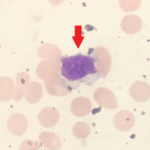NEW YORK (Reuters Health)—Patients can develop rebound-associated vertebral fractures after stopping denosumab, a new report of nine cases shows.
All of the patients were considered to be at low risk of fracture, and the fractures occurred within nine to 16 months of their last injection, Dr. Olivier Lamy and colleagues from Lausanne University Hospital in Switzerland report.
“Studies are urgently needed to determine: 1) the pathophysiological processes involved; 2) the clinical profile of patients at risk for rebound-associated vertebral fractures; and 3) the management and/or treatment regimens after denosumab discontinuation,” Dr. Lamy and his team wrote in a paper online October 12 in the Journal of Clinical Endocrinology and Metabolism.
Denosumab is approved for treating osteoporosis and for preventing loss of bone in patients on certain cancer treatments. Side effects can include osteonecrosis of the jaw and atypical femoral fracture, the authors note, but the optimal treatment duration with denosumab has not been defined.
There is no rebound effect after bisphosphonate discontinuation, the authors add, but discontinuation of denosumab is associated with severe bone turnover rebound (BTR) and rapid loss of bone mineral density (BMD). Earlier in 2016, they reported severe spontaneous vertebral fractures in three patients after discontinuation of denosumab. In the current report, they describe these cases and six more patients with rebound-associated vertebral fractures at their hospital.
Dr. Lamy and colleagues note that they treat about 200 patients per year with denosumab. They also identified 32 women with osteoporosis who stopped taking the drug and did not develop vertebral fractures; 26 had been treated with bisphosphonates before or after taking denosumab.
It may be possible to reduce or prevent BTR with denosumab by administering bisphosphonates before or after treatment with the drug, based on their own clinical experience, the researchers note.
“The expected compliance of patient and the resources to guarantee medical examination at regular intervals should be considered before starting denosumab treatment,” they add. “However, oncedenosumab is started, it should be scrupulously given every six months.”
They call for randomized controlled trials to investigate the role of pre- and post-treatment with bisphosphonates in decreasing rebound-associated vertebral fractures after denosumab discontinuation.
“In the meantime, health authorities, physicians and patients must be aware of this . . . risk, anddenosumab injections must be scrupulously done every six months, but not indefinitely,” the researchers conclude.
Dr. Lamy did not respond to an interview request by press time.
Reference
Lamy O, Gonzalez-Rodriguez E, Stoll D, et al. Severe rebound-associated vertebral fractures after denosumab discontinuation: nine clinical cases report. J Clin Endocrinol Metab. 2016 Oct 12:jc20163170. [Epub ahead of print].

